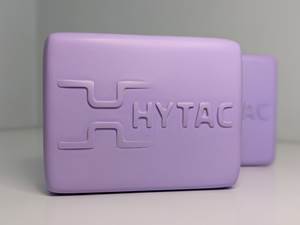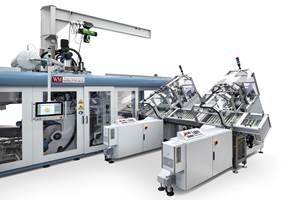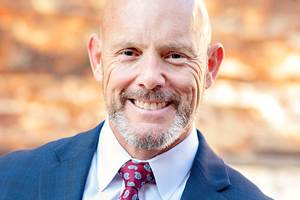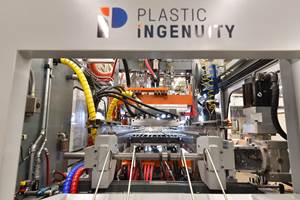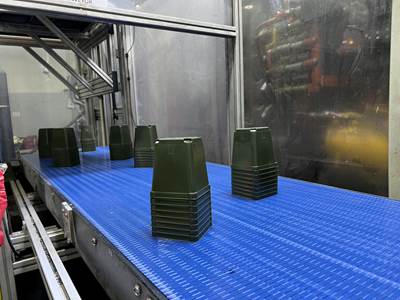Thermoformer Tosses Gauntlet to Injection Molders
Profile Plastics in Lake Bluff, Ill., has prospered for 43 years as a heavy-gauge custom thermoformer by investing steadily in the latest technology and then applying it in highly practical ways.
Profile Plastics in Lake Bluff, Ill., has prospered for 43 years as a heavy-gauge custom thermoformer by investing steadily in the latest technology and then applying it in highly practical ways. An example of this approach is its recent purchase of an unconventional vacuum-forming machine from Geiss Thermoforming USA, Elk Grove Village, Ill. The German-made unit is one of the first halogen-heated, in-line, closed-chamber-style machines in the U.S.
“Forming thrives on one-of-a-kind projects involving intense collaboration,” says Stephen Murrill, owner and president of Profile Plastics since 1987. His plant runs 24/7, with 80 employees operating about a dozen vacuum- and pressure-forming machines.
Murrill, 54, a native of Parkersburg, W.Va., and son of a DuPont Co. official, got an early taste of processing in a high school program that involved ABS part prototyping. He later earned a chemical engineering degree at Purdue University and sold PP resin for Exxon Corp. Murrill credits lessons from these experiences for the disciplined approach he now takes to running his own business.
Profile Plastics specializes in large, technical parts for medical, analytical, and electronic equipment, as well as appliances and materials-handling components. In a decade, it has won no fewer than 11 Society of Plastics Engineers (SPE) industrial part design awards. The firm’s newly acquired Geiss machine is meant to help maintain that momentum, one goal being to benchmark its efficiency versus standard three-station rotary equipment. Geiss’ halogen heating will be exploited to extend Profile’s use of heat-sensitive materials.
Competing with injection
Murrill’s goal in buying Profile was to thermoform parts equal to injection molding in look, quality, and precision, yet surpassing them in design ingenuity and economy. At the outset, process limits barred his way. Initial deficits included inability to trim parts with precision equal to injection moldings and difficulty in measuring part dimensions in order to guarantee quality on a repeatable basis.
Luckily, the rise of multi-axis CNC routers provided a way to address trim speed and precision. Profile was an early advocate of these machines and pioneered their use in thermoforming in the late 1980s. The guiding spirit was chief engineer Stephen Sweig, whose accomplishments included improving the controls and reducing set-up and changeover times for CNC machines. Virtually all Profile’s parts are now CNC trimmed.
By the mid-1990s, Profile was addressing precision measurement by investing in coordinate measuring machines (CMMs)—computer-aided devices for measuring critical part parameters on a repeatable basis. CMMs allowed Profile to go after more demanding applications.
A recent emphasis has been hollow parts, where twin-sheet forming has inherent advantages over competing processes. Profile operates three dedicated twin-sheet pressure formers and has other machines usable for both twin- and single-sheet projects. The company won an SPE award for a twin-sheet surgical helmet that incorporated an air-flow plenum and reduced 14 parts to one.
Sales director Ed Probst says Profile targets parts with layflat surface areas between 1 and 130 sq ft and production volumes of 1000 to 20,000 parts/yr. Profile’s strategy is to work with long-term, dependable customers. Murrill defines long-term as a relationship over at least three years, depending on part size and complexity. He cites the example of a bicycle workout machine housing for a recreational equipment customer. That product ran for eight years, averaging 8000 units/yr.
Profile has also been adept at hiring and retaining first-rate personnel, especially talented engineers able to husband complex programs to reality. Two who stuck with Profile since Murrill bought it 16 years ago are Probst and quality director Fred Steiner. Another veteran is Stephen Sweig, recipient of last year’s SPE “Thermoformer of the Year” Award, who was cited for advances in CNC trimming and twin-sheet forming. Murrill says the loyalty of Profile’s employees is a major factor in its ongoing success.
Related Content
High-Temperature Syntactic Foam and High-Slip Plug Materials for Thermoforming
At K 2022, CMT Materials to launch new Hytac syntactic foam and a developmental higher slip plug materials with no PTFE.
Read MoreAutomation in Thermoforming on the Rise
Equipment suppliers’ latest innovations exemplify this trend driven by factors such as labor shortages, higher-speed thermoformers and tighter quality control.
Read MoreOMV Technologies Gets New CEO
Kooper brings 33 years of experience in the industrial and consumer packaging industries to OMV--the closed-loop, turnkey, inline extrusion, thermoforming and tooling systems manufacturer.
Read MoreIngenuity Is Part of This Former’s Name, and in Its DNA
Plastic Ingenuity started in a garage in 1972 and through a commitment to developing best-in-class products stands today as one of the largest custom thermoformers in the world.
Read MoreRead Next
Processor Turns to AI to Help Keep Machines Humming
At captive processor McConkey, a new generation of artificial intelligence models, highlighted by ChatGPT, is helping it wade through the shortage of skilled labor and keep its production lines churning out good parts.
Read MorePeople 4.0 – How to Get Buy-In from Your Staff for Industry 4.0 Systems
Implementing a production monitoring system as the foundation of a ‘smart factory’ is about integrating people with new technology as much as it is about integrating machines and computers. Here are tips from a company that has gone through the process.
Read MoreAdvanced Recycling: Beyond Pyrolysis
Consumer-product brand owners increasingly see advanced chemical recycling as a necessary complement to mechanical recycling if they are to meet ambitious goals for a circular economy in the next decade. Dozens of technology providers are developing new technologies to overcome the limitations of existing pyrolysis methods and to commercialize various alternative approaches to chemical recycling of plastics.
Read More


















